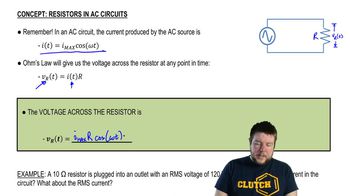Resistors in AC Circuits definitions Flashcards
 Back
BackResistors in AC Circuits definitions
1/12
Terms in this set (12)
- ResistorA component that opposes the flow of electric current, causing a voltage drop.
- AC CircuitAn electrical circuit powered by an alternating current, where the current changes direction periodically.
- SinusoidalA waveform that describes a smooth periodic oscillation, typical of AC current.
- Ohm's LawA principle stating that the current through a conductor is directly proportional to the voltage across it.
- VoltageThe electrical potential difference between two points, driving current through a circuit.
- CurrentThe flow of electric charge in a circuit, measured in amperes.
- ResistanceA measure of the opposition to current flow in an electrical circuit, measured in ohms.
- RMS VoltageThe root mean square value of voltage, representing the effective value of a varying voltage.
- RMS CurrentThe root mean square value of current, representing the effective value of a varying current.
- Maximum CurrentThe peak value of current in an AC circuit, calculated as RMS current times the square root of two.
- Equivalent ResistorA single resistor that can replace a combination of resistors in a circuit without changing the current.
- OmegaThe angular frequency of a sinusoidal waveform, representing how fast the waveform oscillates.


